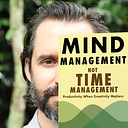Does Patreon have a crisis quirk?
Every creative monetization model has its quirks. Those quirks incentivize certain behavior.
For example, the ad-supported model incentivizes you to attract eyeballs to your pages. This incentivizes click-bait headlines and sometimes downright misinformation.
As new models emerge, it’s only natural that each will have new quirks that incentivize different behaviors.
I recently noticed a quirk with the Patreon model. The Patreon model incentivizes crises.
I had some problems with my visa to stay where I live in Colombia. It was one of the most harrowing experiences in my life. I had to drop everything and leave the country. As I write this, I’m on the cusp of taking an involuntary two-week trip to manage the number of days I spend in the country on a tourist stamp.
On my podcast, I told my followers what was going on. Then my Patreon support jumped.
Since I announced my crisis, the number of patrons jumped about 50%. My overall monthly earnings—thanks to a few ultra-generous patrons—doubled.
These new patrons weren’t supporting my work merely to help me with my crisis. That’s what something like GoFundMe is for.
Instead, when I asked why they chose to support me on Patreon, most said something along the lines of, “I’ve been putting it off, and this crisis inspired me to finally act.”
Around the same time that I experienced this crisis, another Patreon creator suffered an even more serious crisis. Simone Giertz, the master of “shitty robots,” announced that she had a brain tumor. Her backing nearly tripled.
Simone had surgery, and is currently recovering (fortunately, as she had been told to expect, her tumor was benign).
It’s heartwarming that people come to the aid of someone who needs help. But the odd thing is that when people choose to back someone on Patreon, it’s ostensibly not because that person needs help. It’s because the patron supports that person’s work.
I don’t have access to why Simone’s fans chose the moment they did to support her work, but if the responses I got from my new patrons are any indication, it’s because they actually had been meaning to back her work for a long time—they just put it off.
(Note that the downward ripples you see on Simone’s graph are not people saying “oh you’re recovering now, so it’s all good.” At the beginning of each month, it’s common to have a drop, as some percentage of people’s payment info turns out to no longer be valid.)
If you’re getting the hebbie jeebies even thinking about this, I don’t blame you. Patreon opens up unfamiliar emotional territory, and there isn’t a long history to draw from in knowing how to navigate it.
We want to believe that we’re all good people, and that if someone needs help, we help them. We also want to believe that if we value someone’s work, we’ll take out our wallets and show them.
But that’s not how human behavior works. We put things off. We’re sprung into action when a big event happens. We show the same inertia when it comes to un-doing our action after the event has passed, something of which anyone who runs a monthly-recurring-revenue business is aware.
If you cruise around on Graphtreon, you can find other examples of crises driving Patreon backing.
When Ethan and Hila Klein of the h3h3 YouTube channel announced they were being sued, their backing jumped.
When Phil DeFranco published the video Tired, Frustrated, But Also Excited, in which he indicated that with the current state of the YouTube platform, “the Phillip DeFranco may not be able to survive,” his backing jumped.
These are all real crises to varying degrees, but real or not, they are incentivized by the Patreon model.
In my more than a decade as an independent creator, I’ve seen the pressures of various models. When you sell an online course, for example, you’re encouraged to apply the “scarcity” principle, by time-limiting your launch.
As I navigate my own crisis, I can feel the same resistance I’ve felt in marketing my work in other models. On one hand, what I’m experiencing is very real. On the other hand, I know that by talking about it, I might cause people who wouldn’t have otherwise parted with their money to do so.
But I also think about it as a consumer of content. Whose content am I enjoying? Why am I putting off supporting them? Is it going to take a crisis?
You can imagine how ugly things could get if creators were to start to intentionally manipulate their followers with the crisis quirk of the Patreon model.
Will other models be less crisis-prone? For example, the Brave browser distributes cryptocurrency to sites you visit—kind of a micro-payments model. It takes no action on the part of the consumer to support someone’s work—they support as they consume.
I like to think that since creators are for the most part individuals, they’ll be reluctant to exploit this quirk. But as individual creators grow into small corporations that need employees to keep things going, the pressures become greater.
New models are springing up for creators to earn a living. It will be interesting to see what other quirks spring up from these models.
I quadrupled my creative productivity. What are the tools I count on? Sign up for the free toolkit here »
